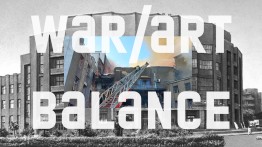War/Art Balance
Thursday, April 27, 2023, 6:30 - 8pm

"War/Art Balance: Deimperializing the Soviet Avant-Garde at the Time of Russia’s War on Ukraine, Its Culture, and People" is a public program in The Cooper Union’s historic Great Hall that brings together a range of voices to speak on the complexities surrounding the histories of the Ukrainian, Russian, and Soviet avant-garde movements. The discussion will challenge and expand the prevailing colonialist lens through which these movements are often viewed and explore the socio-political context in which the movements were born, shaped, and ultimately suppressed. The panel will delve into the ways that history and culture can be instrumentalized, particularly in light of the Russian invasion and ongoing war in Ukraine.
The Shevchenko Scientific Society and The Ukrainian Museum are partners for the event.
Panel Participants: Tetyana Filevska, Mayhill Fowler, Myroslava Mudrak, and Brad Samuels. Moderated by Oleh Kotsyuba.
Proof of vaccination or proof of a negative PCR test (taken within three days of the event) or a rapid test result (home test results are not acceptable) is necessary. Masks are encouraged.
Tetyana Filevska is a specialist in the field of contemporary art, curation, and writing, and is currently the creative director of the Ukrainian Institute, Kyiv (part of Ukraine’s Ministry of Foreign Affairs). Her published books include Kazimir Malevich: Kyiv Period 1928-1930 and Dmitro Gorbachov. Sluchayi. She graduated with honors from the Faculty of Philosophy of the Taras Shevchenko National University of Kyiv and is a graduate of the FLEX exchange program, funded by the U.S. government. Filevska has previously worked at the EIDOS Foundation Centre for Contemporary Art, the Center for Contemporary Art Foundation, and Izolyatsia: Platform for Cultural Initiatives, and she curated the public program for the Ukrainian Pavilion at the 59th Venice Biennale, dedicated to decolonization.
Dr. Mayhill C. Fowler is an associate professor in the Department of History at Stetson University. She has published and presented widely on culture in Ukraine, including her book Beau Monde on Empire's Edge: State and Stage in Soviet Ukraine (Toronto, 2017). She is currently writing a book on theater women in Ukraine over the 20th century and researching a project about the former Soviet Army Theater in Lviv. She was a fellow at the Harvard Ukrainian Research Institute and the University of Toronto, and a Fulbright scholar to Ukraine 2019-2020. She is an affiliated researcher with the Center for Urban History in Lviv, affiliated faculty in the Program in Theater Studies at Ivan Franko National University, and a full member of the Shevchenko Scientific Society in New York. A former actress, she holds an M.F.A. from the National Theater Conservatory, a B.A. in Slavic Languages from Yale University, and a Ph.D. from Princeton University.
Myroslava Maria Mudrak, Emerita Professor of the History of Art, The Ohio State University, specializes in the field of modernist art of the late 19th and early 20th centuries. Her scholarly interests focus on Eastern Europe, Ukraine, Russia, and the former Soviet Union in relation to the philosophical and stylistic developments of the West. For more than three decades, she taught at The Ohio State University, and lectured on the ideological discourses, socio-political influences, and artistic practice within East European cultures that use modernity to signify national identity. Mudrak’s seminal work, New Generation and Artistic Modernism in Ukraine (1986) was awarded the Kovaliw Prize for Ukrainian Studies and was published in a Ukrainian translation by Rodovid Press in 2018. In 2020, Mudrak was elected as a Foreign Member to the National Academy of Arts of Ukraine. She is a full member of the Shevchenko Scientific Society of America.
Brad Samuels is an assistant professor adjunct in The Irwin S. Chanin School of Architecture at The Cooper Union and founding partner at SITU, an unconventional architecture practice based in New York City that uses design, research, and fabrication for creative and social impact. He is responsible for strategic oversight and directs SITU’s research division which focuses on the intersection of design, human rights and technology. At SITU Research, Brad is focused on merging data and design to create new pathways for justice. Samuels has overseen the team’s visual investigations for legal and advocacy organizations including The International Criminal Court, Human Rights Watch, Amnesty International, The Associated Press, Frontline, The United Nations and many others. In addition, Samuels sits on the Technology Advisory Board for the International Criminal Court, The Advisory Board for the Carnegie Mellon's Center for Human Rights Science, the Advisory Board for Dartmouth's Wright Center for the Study of Computation and Just Communities, and the board of The Architectural League of New York.
Oleh Kotsyuba is a scholar of literature and culture, manager of publications at Harvard University's Ukrainian Research Institute, and director of the Ukraïnica database project on primary sources for the study of Ukraine. He is also the chief online editor at Krytyka, a leading Ukrainian intellectual journal.
Exhibitions and events presented by The Irwin S. Chanin School of Architecture Archive are made possible by the New York State Council on the Arts with the support of the Office of the Governor and the New York State Legislature.
Located in The Great Hall, in the Foundation Building, 7 East 7th Street, between Third and Fourth Avenues




